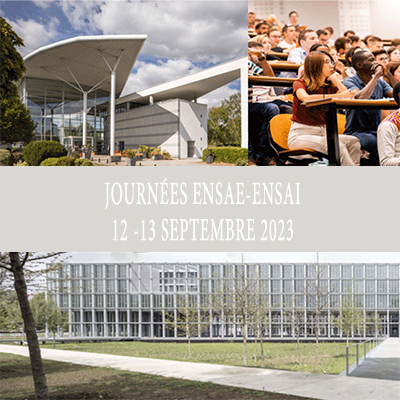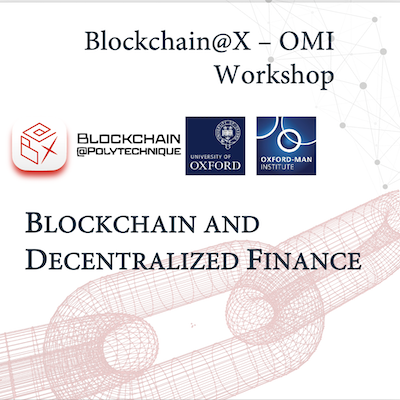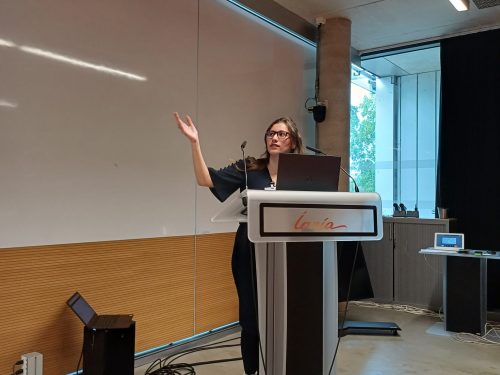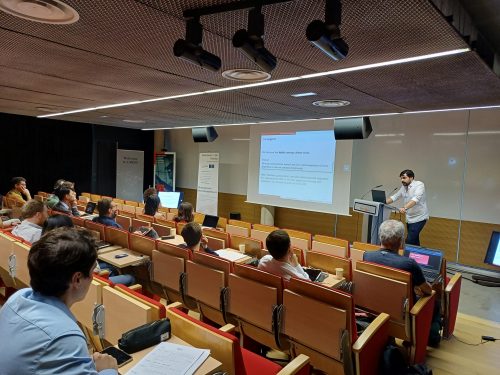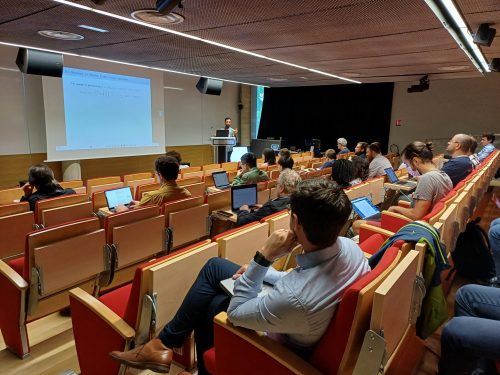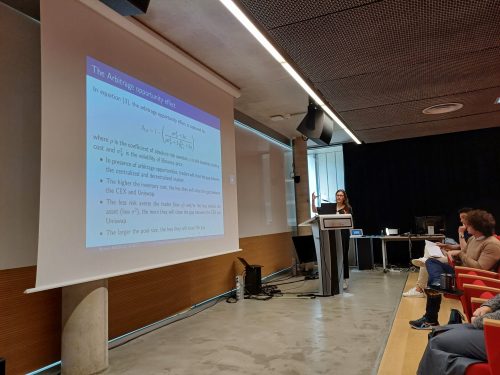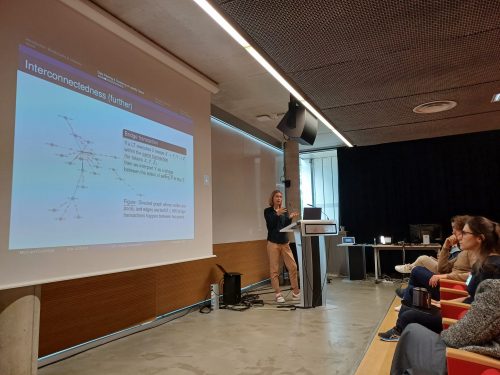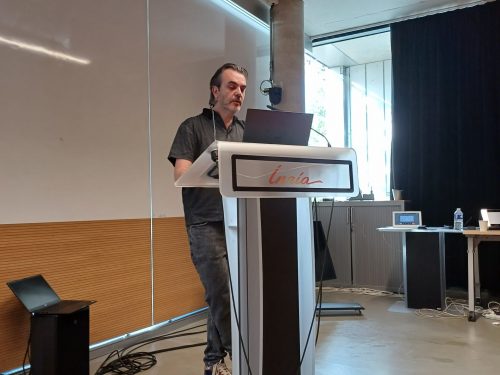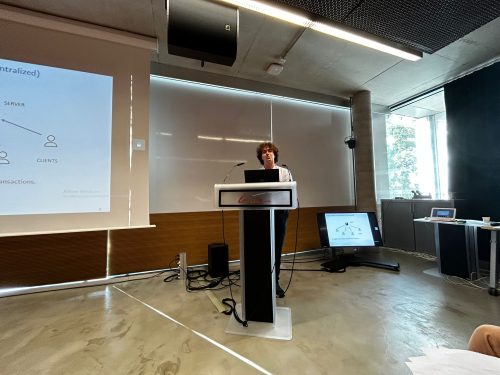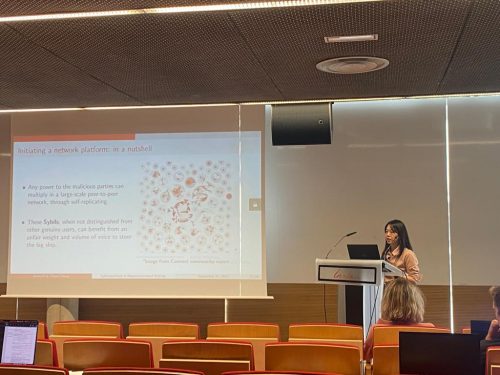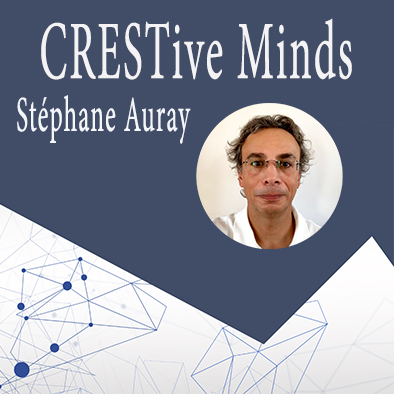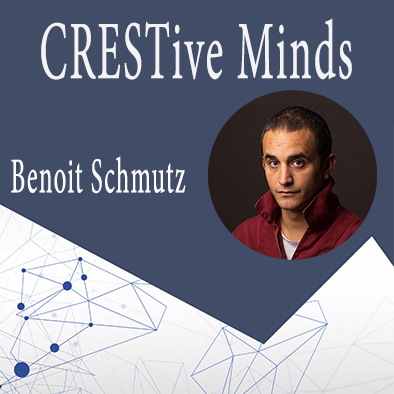On September 12 and 13, statisticians from both campuses of CREST (Bruz, ENSAI and Palaiseau, ENSAE) as well as statisticians from INSEE gathered for the Statistical workshop ENSAE-ENSAI at Palaiseau to present their current work. The event was organized by Victor-Emmanuel Brunel, Professor in Statistics ENSAE/CREST and Adrien Saumard, Associate Professor in Statistics ENSAI/CREST.
The primary objective of these meetings between statisticians from ENSAE and ENSAI, as well as statisticians from INSEE, is to enhance exchanges and foster collaborations between the two CREST campuses and INSEE. The event featured participants delivering 30-minute presentations.
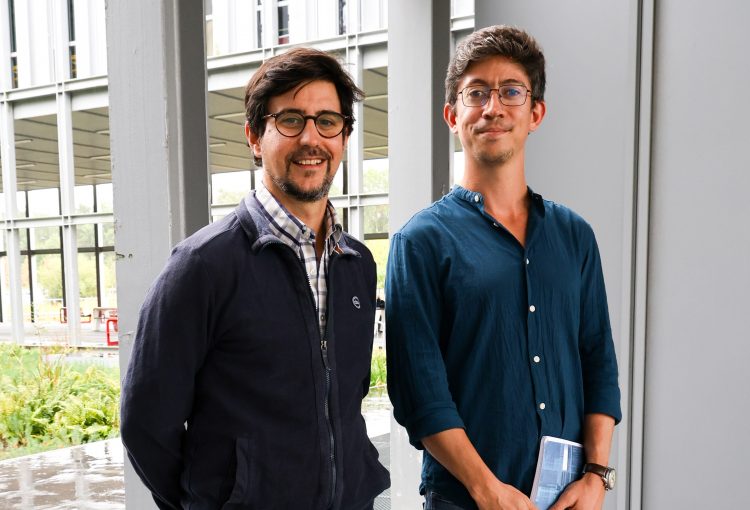
Statistical insights from the CREST workshop
On the first day of the workshop, a diverse range of topics in statistics was explored through a series of presentations. Researchers delved into intriguing subjects such as preemption and learning in stochastic scheduling, determinantal sampling designs, and the theoretical perspective and practical solutions related to kernel Stein discrepancy thinning. The day also featured discussions on dynamic modeling of abundance data in ecology, non-parametric intensity estimation of spatial point processes employing random forests, and the complexities of repeated bidding with dynamic value. Additionally, topics like adaptive functional principal components analysis, learning patterns within multivariate functional data, and the concentration of empirical barycenters in non-positively curved metric spaces contributed to a rich and stimulating day of statistical exploration and research.
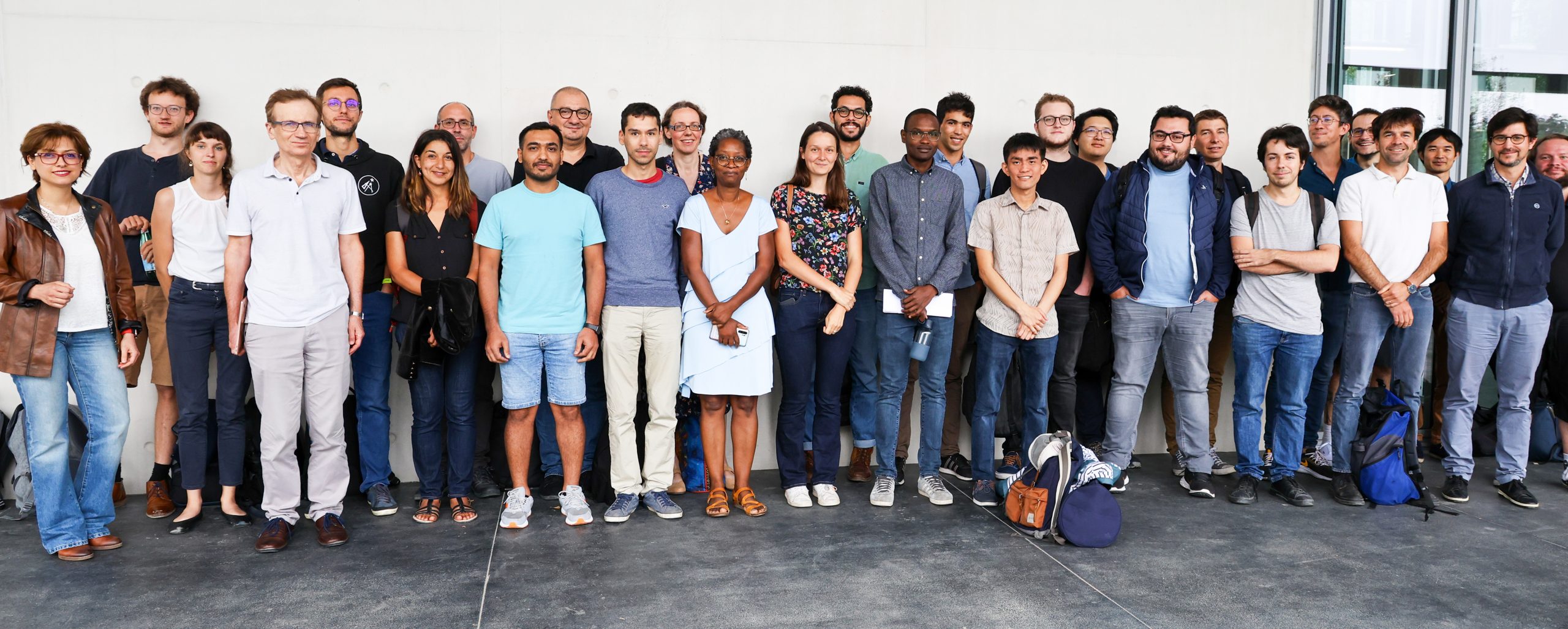
The second day of the workshop continued to offer a diverse array of statistical topics and insights. Researchers engaged in discussions about scalable and hyper-parameter-free covariate shift adaptation through a conditional sampling approach, contributing to the field’s adaptability and scalability. Another session explored risk-aware bandits with implications for improving crop management practices, bridging statistical methods with real-world applications. The day also delved into “Topics on methodology for official statistics,” providing valuable insights into the methodological considerations for producing authoritative statistical information. In addition, there were discussions on “Learning the smoothness of weakly dependent functional time series,” a crucial topic in understanding data patterns. Lastly, the finite-sample performance of the maximum likelihood estimator in logistic regression was explored, shedding light on the practical applications of statistical techniques in this context. The second day continued to enrich the workshop with a broad spectrum of statistical research and its real-world implications.
CREST: a collaboration between Bruz (ENSAI) and Palaiseau (ENSAE Paris) campuses
The recent statistics workshop held at ENSAE Paris exemplified the collaborative spirit between our campuses in Bruz at ENSAI and Palaiseau. This event provided researchers from both locations with a unique opportunity to connect, share ideas, and contribute to the advancement of statistical research. It underscored the enduring commitment to knowledge exchange and academic synergy that characterizes the partnership between our two campuses.
« La France est dans une situation inflammable »
Une interview de l’économiste Pierre Boyer par Grégoire Normand pour le journal La Tribune – 13 Oct 2023
Blockchain@X-OMI Workshop on Blockchain and Decentralized Finance
The Blockchain@X-OMI Workshop on Blockchain and Decentralized Finance (DeFi) was held on September 21-22 2023 at the Alan Turing building at INRIA on the École Polytechnique campus.
A gathering of multidisciplinary minds
The workshop brought together 22 scholars from a variety of backgrounds, such as economics, computer science, and mathematics, who presented their working papers. The academic presentations were complemented by three industrial talks delivered by blockchain innovators of the private sector.
The workshop highlighted the importance of a multidisciplinary approach to its central topic: As experts from various fields discussed similar issues but from different angles, the combination of their insights improved everyone’s understanding. From the talks of blockchain innovators such as Kamea Labs, StarkWare, and Giza, the workshop also made evident that blockchain and DeFi research has a large potential for experimentation in the private sector.
Towards a better understanding of blockchain and decentralized finance ecosystems
The presentations were sectioned into six sessions with strong interlinks to the central theme of blockchain and decentralized finance (DeFi). On the first day, the workshop dived into topics concerning distributed consensus and the game theory of information aggregation in distributed systems. The successive session, on the financial analysis of Automated Market Makers (AMMs), received valuable discussions on how to employ stochastic optimal control tools to devise trading, liquidity provision, and risk prediction strategies in a Constant Product Market Maker (CPMM). The afternoon’s presentations shifted the focus towards the network security of DeFi protocols. Presenters identified existing attacks that weaken governance in DeFi ecosystems and devised machine learning and artificial intelligence solutions to mitigate them.
The second day started with an empirical network analysis of Decentralized Finance (DeFi) protocols. One presenter graphically analysed DeFi marketplaces to explain trading behaviours. Another presenter with a Physics background assessed the health of these new markets using an interesting analogy the ideal thermal law. In the afternoon, the workshop delved into AMM design, featuring six papers that pointed out the exploitable vulnerabilities of AMMs to liquidity providers in the face of swap fees and adversarial liquidation. Some papers shed light on alternative trading protocols by introducing external pricing oracles, looking beyond the CFMM formula, and using batch trading. The topic shifted more to the AMM ecosystem improvements, mixed with also a historical look into the distributed system refinements that moulded blockchains today.
The first event co-organized by Blockchain@X Research Centre (École Polytechnique) and Oxford-Man Institute of Quantitative Finance (University of Oxford)

Blockchain@X Research Centre and Oxford-Man Institute of Quantitative Finance crossed paths in examining the financial market structure unprecedentedly facilitated by blockchain technologies. The Blockchain@X chair is directed by Professor Julien Prat (CNRS & CREST, École Polytechnique, IP Paris) and Professor Daniel Augot (Inria Saclay & École Polytechnique, IP Paris). The chair bridges economics and computer science to broadly identify challenges in the blockchain today. This diversity of its researchers’ expertise was reflected in the presentations given by the team, ranging from mechanism design and macro-foundations of utility tokens, to econometric and graph data-driven analysis of DeFi protocols.
Carrying a similar vision, at the Oxford-Man Institute (OMI), led by Professor Álvaro Cartea (University of Oxford), has the mission of addressing fundamental problems in quantitative finance. In particular, the participating speakers covered DeFi topics with a strong focus on the ecosystems of liquidity pools and financial decision-making in these new trading venues.
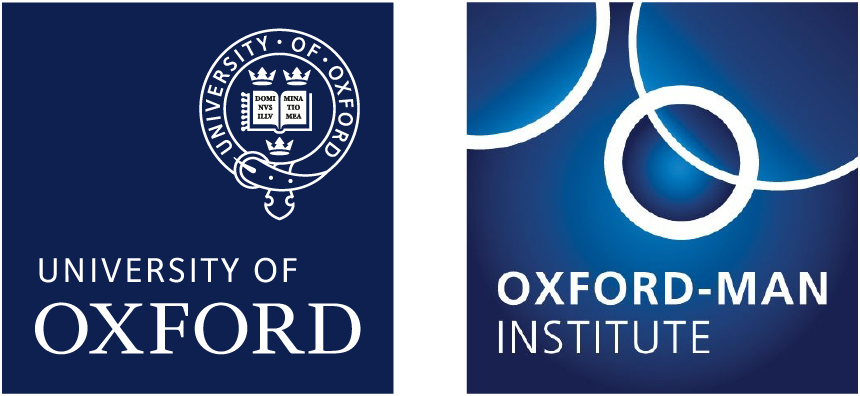
The Blockchain@X-OMI collaboration aimed at attracting academics and industrial partners to advance this emerging field of blockchain through research and application in Europe. Blockchain is a fast-evolving industry that has been absorbing endeavours from various studies that continuously inspect and propose implementations for improving performances. To synchronise the outputs from the university labs and the industry, this workshop served as an exchange channel to broadcast peoples’ work and incubate future collaborations.
CRESTive Minds – Épisode 2 – Stéphane Auray

Researcher portrait: Stéphane Auray, professor at ENSAI, research associate at CREST.
What is your career path?
I completed my PhD at Toulouse School of Economics. Before joining Ensai and the CRESt, I was a Professor in Canada and then in the north of France, where I still hold a position.
What are your research topics?
I have been working on various topics like the economics of war, extreme events, monetary and fiscal policies, heterogenous agent models, labor economics, open economy, all topics being mostly in macroeconomics. I have also worked with my colleagues in the North of France on the definition of what could be an optimal network for the transportation of hydrogen.
Which economist has particularly inspired you and why?
I could have said Robert Lucas because he changed everything in macroeconomics. However, the economists who changed my life as a researcher are my advisor Patrick Fève, who gave me his passion for macroeconomics, and Paul Beaudry because of the speed with which he thinks about economics and because of the super high flow of ideas he might have.
Has the research of the eminent economist Daniel Cohen, who has just passed away, nourished or influenced your work?
Yes, his view about the persistent high unemployment dynamics since the 70’s and his analysis of the high productivity per hour worked in France convinced about the importance of working on the labor market mechanisms.
In one of your latest publications, you put education and the subject of “moonlighting”(undeclared work) into perspective- could you tell us more?
Well, in this paper we document three facts: (i) Higher educated workers are more likely to moonlight; (ii) conditional on education, workers with higher wages are less likely to moonlight; and (iii) the prevalence of moonlighting is declining over time for all education groups.
More importantly, as my son believes that I am a poet, since he looked at some of my codes, I wanted the title to look like the title of a poem.
In the article “Household Income, Liquidity, and Optimal Unemployment”, you and your co-authors demonstrate that workers have different levels of liquidity at their disposal to smooth their consumption during a period of unemployment. They either accept the system by paying into it, or they opt out. You explain that this decision gives rise to a several ground-breaking results with political implications.
Yes this is true. These results are very striking and might have very important consequences on the labor markets when we are in a recession and when the unemployment rate is high. The political implications are numerous, as one might want to make the unemployment benefits system depend on a households’ liquidity at their disposal with some thresholds. What would be done next would be to calculate the optimal liquidity amount to decide the UI benefits amount the unemployed may receive.
As an economist specializing in this field, what is your view of the current unemployment situation in France since the new unemployment insurance regulations came into force in February 2023?
Adjusting UI benefits depending on economic activity seems like a good idea, provided that this modulation varies from one sector to another, some being in tension when others are not.
And indeed, reforming unemployment insurance is essential: our system is suffering from too complicated rules, with levels of compensation sometimes lower than the RSA.
In addition, certain beneficiaries who do not work cope well by managing to accumulate different types of benefits or
aids.
In France, as in many other countries, household income is being swallowed up by the current inflation caused by COVID and the war in Ukraine.Today, faced with this global financial configuration, what economic policy could mitigate the consequences of this crisis, and is there a country that applies a particular economic model that has enabled it to be less impacted?
The only way to face this new crisis after the ones of 2007, 2011 and the coronavirus is to increase coordination between countries. Unfortunately, countries are less and less open to such coordination. The only way to get out of this crisis of high inflation, low unemployment rate and high employment rate is to accept a wage cut and a recession.
Recently, you’ve been working with Aurélien Eyquem on customs law, in what way is this an important economic and political issue?
Countries distort trade patterns (‘trade wars’) to gain strategic advantage relative to one another. At the same time, monetary policies are set independently and have spillover effects on partner countries (‘currency wars’). This is in line with your previous question as countries are more and more willing to adopt protectionist rulesthat are affected by monetary policies. When considering trade imbalances, we find that both inflation and tariffs depend critically upon the currency denomination of internationally traded bonds.
In your opinion, what impact will AI have on the economy and employment in the near future?
AI will displace employment just as employment moved to the service sector, this is only a question of the history of our modern societies.
It is certain that when we deal with more qualified jobs and not manual work, it is immediately frightening, but we should not be afraid of it.
This is good news even if the speed at which AI is spreading around the world can be scary.
A series of innovations in this world are there to occupy the time spent at leisure and this is, for example, the case of ChatGPT for the moment.
However, little by little, this will affect work and could generate productivity gains.
Économie du développement et démographie
“Économie du développement et démographie : les cas extrêmes de l’Afrique et de la Chine”: Une interview de Pauline Rossi par Pierre Rousseaux pour le journal Oeconomicus – 4 octobre 2023
RAPPORTS IPP n° 46 & 47
“Nouvelle évaluation des réformes de la fiscalité du capital” par Clément MALGOUYRES, Laurent BACH, Antoine BOZIO et Arthur GUILLOUZOUIC: Trois ans après ses premiers travaux, l’IPP publie mardi 17 octobre deux nouvelles évaluations des réformes de 2017 ayant conduit à la mise en place du prélèvement forfaitaire unique (PFU), au remplacement de l’impôt de solidarité sur la fortune (ISF) par l’impôt sur la fortune immobilière (IFI) et à la baisse de l’impôt sur les sociétés – Octobre 2023
CRESTive Minds – Épisode 1 – Benoît Schmutz

Portrait de chercheur.e : Benoît Schmutz, professeur associé au département d’économie de l’Ecole Polytechnique, membre du CREST et de l’IPP, actuel titulaire de la Chaire Professorale Jean Marjoulet.
Quel est ton parcours ? Quels sont tes sujets de recherches ?
J’ai toujours été intéressé par les questions d’aménagement du territoire et d’urbanisme. Après une licence d’urbanisme, j’ai poursuivi un parcours en géographie et j’ai étudié les déterminants de la mobilité résidentielle dans l’Afrique du Sud post-apartheid, ainsi que les formes urbaines liées à la coexistence, au sein des métropoles contemporaines, de groupes sociaux d’origine et d’histoire très diférentes. J’ai naturellement bifurqué vers l’économie, qui me paraissait ofrir une palette d’outils utiles pour étudier ces questions, et j’ai écrit une thèse sur le logement des immigrés africains en France. Depuis, j’ai travaillé sur des questions essentiellement liées à l’économie urbaine et l’économie du travail : comment recherche-t-on un emploi en dehors de son lieu de résidence ? quels liens y-a-t-il entre le fonctionnement du parc de logements sociaux et la ségrégation des immigrés ? peut-on aider les quartiers pauvres et enclavés en incitant les entreprises à s’y installer par le biais de politiques fscales avantageuses ? J’ai peu à peu élargi le champ de mes recherches pour y inclure des thématiques liées à l’économie politique, ainsi qu’aux efets de pairs dans l’apprentissage.
Que représente pour toi cette nomination à la Chaire Jean Marjoulet ?
Je suis très honoré par cette nomination, à la suite de chercheurs de haut niveau en mathématiques, informatique et physique. L’économie fait partie intégrante du domaine d’excellence de l’Ecole Polytechnique et cette reconnaissance est aussi celle du département, et du CREST.
Quels sujets de recherches souhaites-tu approfondir au sein de cette chaire ?
Mon projet s’intéresse à une vieille question, peut-être pas aussi ancienne que les villes elles-mêmes, mais certainement multiséculaire, à savoir si les villes, autour desquelles la civilisation que nous connaissons s’est construite, sont vouées à disparaître, face à l’accumulation des difcultés si souvent dépeintes par les récits dystopiques d’anticipation. Ce discours est assez saillant aujourd’hui, pour plusieurs raisons. Tout d’abord, dans les pays les plus développés, l’exode rural est terminé : en France, par exemple, le solde migratoire entre ville et campagne s’est stabilisé depuis près de 50 ans. Cette observation est liée, de façon complexe, au processus de désindustrialisation en Europe et en Amérique du Nord : la création de richesse en ville n’est plus directement liée aux économies d’échelles si importantes dans l’industrie. Ensuite, très récemment, la pandémie du Covid-19 a mis en évidence la vulnérabilité humaine liée aux fortes densité de population, conduisant de nombreuses personnes à réévaluer la nécessité de résider en ville. Cependant, ces phénomènes, de très long terme pour l’un, ou très récent pour l’autre, sont difciles à appréhender de façon systématique pour le moment. Ils sont par ailleurs liés à un troisième déterminant : l’essor des technologies de communication, qui, en théorie, rendent la coprésence physique facultative dans les processus de rencontres historiquement facilités par les villes.
Ce mécanisme est récent : de l’ordre de quelques décennies. Il peut être étudié avec les données de plus en plus riches à notre disposition. De nombreux travaux de recherche qualitative ont depuis longtemps établi le rôle des villes dans la facilitation des interactions sociales, depuis l’agora antique. Y répondre de façon quantitative et statistique nécessite un grand nombre de présupposés méthodologiques. Je pourrai m’appuyer sur le cadre développé par l’économie urbaine, qui conçoit la ville comme la rencontre entre un marché de consommation, un lieu de production, sous des contraintes technologiques liées notamment aux déplacements quotidiens, à la concurrence des usages alternatifs de la terre et aux problèmes de construction. Les villes, plus coûteuses à l’usage, ont néanmoins l’avantage de rendre les agents plus productifs : ce sont les économies d’agglomération. Ces dernières sont de nature diférente : la densité permet le partage de ressources indivisibles, elle favorise la transmission des savoirs, et elle augmente la qualité et la vitesse des rencontres : c’est à ce dernier mécanisme que mon projet s’intéresse. Bien entendu, qualité et vitesse des rencontres sont difciles à mesurer : on n’observe généralement pas les rencontres qui n’ont rien donné ; quant à la qualité, elle est en partie subjective, et requiert une modélisation préalable, ou bien l’emploi de variables proxy, comme la durée des appariements réalisés.
Toutefois, ces économies d’appariement sont remises en cause par la montée en puissance de technologies qui permettent des rencontres dans l’espace, non plus géographique, mais numérique. Ces technologies bouleversent de multiples aspects de la vie sociale, à des degrés divers, et on peut se demander si, aujourd’hui, les rencontres sont toujours plus rapides et plus efcaces en ville. Il est possible que ces évolutions ne jouent que sur les premières étapes du processus d’appariement : la mise en relation, mais que la conclusion d’un accord soit encore largement tributaire d’interactions en présentiel. Par ailleurs, d’un point de vue théorique, l’économie géographique et l’économie du commerce international ont bien montré que l’impact des frictions spatiales sur les inégalités spatiales n’était pas monotone. Dans certains cas, diminuer ces frictions peut au contraire renforcer le pouvoir d’attraction des grandes métropoles. Enfn, ces technologies numériques ne sont pas neutres, et sont elles-mêmes soumises à des phénomènes de types gravitaire, liées aux algorithmes de recommandation, par exemple.
Les rencontres concernent le marché du travail, la mise en couple, la poursuite de loisirs, ou encore la mobilisation politique. Ces diférentes thématiques peuvent sembler disparates. Cependant, elles se prêtent à la modélisation, en utilisant des outils théoriques et statistiques assez similaires, empruntés à l’économie géographique, l’économie du travail, et l’organisation industrielle. Une des astuces des modèles urbains est de supposer que chaque observation, en coupe, est le refet d’un équilibre spatial : aucun agent, étant donné ses préférences et ses contraintes, n’est capable ou désireux de se relocaliser. Cette hypothèse heuristique, plausible à court terme, permet de comparer des équilibres (mais plus difcilement, d’étudier les processus de transition entre deux équilibres). Parmi les autres outils, on peut citer la fonction d’appariement, au coeur du travail des prix Nobel d’économie 2010, ainsi que la notion de supermodularité de la fonction de production liée à l’appariement, qui mesure le niveau de complémentarité entre les parties prenantes (employeur et employé, partenaires dans un couple, élève et professeur, etc.). A ces concepts théoriques, on peut, en utilisant diférentes techniques économétriques, faire correspondre des quantités statistiques, issues de l’emploi de diverses bases de données : l’une des ambitions de ce projet et d’opérer des jonctions entre les trois types de données traditionnels : les données administratives, souvent très granulaires, ce qui est utile dans une perspective géographique ; les données d’enquête, plus précises sur certains aspects ; et les données Internet, qui, dans le meilleur des cas, combinent les atouts des deux sources précédentes, mais peuvent pâtir de problèmes de représentativité.
Grâce aux fonds mis à ma disposition par l’intermédiaire de la Chaire Marjoulet, je vais pouvoir consolider et étofer les équipes dévouées aux diférents projets, et mettre en place les conditions de fabrication et d’exploitation des diférentes bases de données nécessaires. Ce travail, sans soutien extérieur, m’aurait pris de nombreuses années, et cette chaire constitue un formidable coup d’accélérateur !
Tu as travaillé un temps aux États-Unis, bien que la géographie urbaine soit très différente, cette expérience américaine a-t-elle modifié ton regard sur la géographie économique et sociale des villes françaises ?
Je ne suis pas sûr que mon expérience de vie aux Etats-Unis ait modifé mon regard, car je travaillais déjà sur
ces questions. Cependant, mon parcours m’a, depuis longtemps, conduit à m’interroger sur les diférences entre la France et les Etats-Unis dans la prise en compte de la dimension multiculturelle des sociétés contemporaines, notamment en ce qui concerne la dimension dite « ethnique », volontairement gommée par la tradition « républicaine » française, alors qu’elle est très souvent mise en avant dans les analyses anglo-saxonnes.
La saturation des villes, l’augmentation du coût de la vie dans les grandes métropoles, et dans un même temps la désertifcation des campagnes et l’inactivité forcée des personnes due au manque d’ofre d’emploi, déséquilibrent notre société. Comment pourrait-on mieux répartir l’emploi et l’activité au sein du territoire ? Le télétravail, serait-il la solution ?
Il n’est pas à exclure que les changements technologiques en cours, notamment liés au télétravail, conduisent à un rééquilibrage partiel entre les territoires, même si son ampleur fnale dépendra également, par exemple, de l’implication des nouveaux arrivants dans les campagnes et les petites villes dans lesquelles ils ont choisi de résider. Par ailleurs, il est possible que ces mouvements, encore limités en nombre, ne bénéfcient qu’à une minorité de lieux sufsamment bien connectés aux grandes agglomérations, générant, de ce fait, de nouvelles fractures spatiales. Nous vivons une période très intéressante : comme je l’ai indiqué plus haut, il n’est pas certain que les grandes villes bénéfcient encore longtemps des avantages qui ont fait leur succès dans l’histoire, si elles ne parviennent pas à se réinventer. La solution viendra peut-être de l’urgence environnementale, car les fortes densités humaines peuvent, sous certaines conditions, aider à réduire l’empreinte environnementale des hommes. Cependant, ces sujets sont assez éloignés de mon champ de compétences !
La question du logement fait également partie de tes recherches. Tu as ainsi démontré que l’accession aux logements dans le privé pour des familles immigrées est très difcile, ainsi, ils doivent se replier sur les demandes de logements publics ou des logements parfois insalubres. Ce phénomène diminue fortement la mixité sociale souhaitée dans une démocratie telle la nôtre, que ce soit dans les quartiers riches ou dans les quartiers pauvres.… Comment l’Etat, s’il le souhaitait, pourrait-il réduire ce fossé qui se creuse entre les diférents quartiers d’une même agglomération ? Plus généralement, la géographie urbaine, influe-t-elle sur l’efficacité des politiques locales ?
Effectivement, les sociétés contemporaines sont caractérisées par d’immenses inégalités spatiales, à diférentes échelles, et les enseignements de la recherche académique sur le sujet tendent à montrer que les politiques publiques peinent à être efcaces, que ce soit pour aider à la mobilité des personnes ou pour relocaliser les activités. Cette situation est explosive, comme nous l’ont rappelé les émeutes urbaines de ces dernières semaines. Dans un opuscule publié en 2021, L’Emploi et le Territoire, je suggérais que les interventions les plus prometteuses consisteraient à agir sur l’ofre immobilière. Chercher à modifer directement les comportements de mobilité des demandeurs d’emploi ou des entreprises revient davantage à jouer sur les symptômes que sur les racines du problème, à savoir que les territoires les plus dynamiques sont devenus inabordables pour une majorité d’acteurs. En France, s’il n’y a pas de pénurie de logement au niveau agrégé, de nombreux facteurs limitent l’ofre de logement dans les grandes agglomérations. Les raisons en sont diverses, à la fois d’ordre patrimonial, institutionnel et politique. Cependant, il existe une tension entre les nécessités de réallocation régionale de l’ofre de logement et les coûts monétaires, sociaux et environnementaux associés à une croissance métropolitaine encore trop souvent synonyme d’étalement urbain. Dans le cadre des technologies de transport actuellement disponibles, cette tension n’a pas été encore résolue. Par ailleurs, les contraintes politiques locales demeurent très fortes. Dans la petite ceinture de Paris, par exemple, les candidats aux élections municipales de mars 2020 se sont souvent vus contraints de promettre qu’ils s’opposeraient à de grandes opérations immobilières futures, au nom de la « préservation d’un cadre de vie ».
L’occupation de l’ensemble du territoire durant la crise des Gilets Jaunes et plus récemment l’essor des manifestations dans des communes de moins de 15 000 habitants comme à Blain ou dans des îles comme Ouessant montrent qu’un nouveau courant de colère, plus global et moins citadin, est en train de naître ; pour certaines communes, c’est une première. Ainsi, la contestation sociale, liée à l’emploi et à la précarité, commence à s’étendre sur l’ensemble du territoire. Comment analyses-tu cela en tant que géographe et économiste ?
Comme beaucoup de chercheurs et de citoyens, j’ai été très intéressé par le mouvement des Gilets Jaunes, qui rattache la France à une dynamique plus globale, où, à la suite des Printemps Arabes, les mouvements sociaux émergent désormais de façon décentralisée, avec un rôle crucial joué par les agoras virtuelles que constituent les nouvelles plateformes numériques. Le mouvement des Gilets Jaunes est consubstantiellement lié aux possibilités de rencontres ofertes par les diférents réseaux sociaux. Sans doute son efcacité initiale, ainsi que sa grande hétérogénéité géographique, sont-elles liées à cette caractéristique. Mais il y a aussi des raisons de penser que cette dépendance numérique a contribué à la radicalisation progressive du mouvement, et à son essoufement. Les territoires peu denses qui se sont mobilisés se sont-ils davantage retrouvés « coincés » dans une mobilisation exclusivement numérique, plus susceptible de se radicaliser, ou, en tout cas, prisonniers de logiques locales empêchant la construction collective de véritables contre-propositions ? Si ces mouvements émergent uniquement en réaction, contre la vie chère, ou contre tel ou tel projet de taxe carbone, je ne suis pas certain que ces nouvelles géographies de la contestation aient davantage de succès que les anciennes.
Inequalities in digital earning
“Voices from Online Labour: Inequalities in digital earning activities across countries”: A post by Paola Tubaro published on her blog Data Big and Small – 03/09/2023
Inequalities in digital earning
“Voices from Online Labour: Inequalities in digital earning activities across countries”: A post by Paola Tubaro published on her blog Data Big and Small – 03/09/2023
Comment concilier impact social et enjeux environnementaux ?
An article by Patricia Crifo in Polytechnique Insights – October 3rd, 2023

